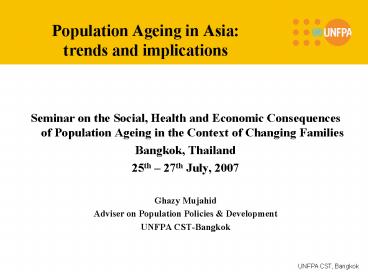Population Ageing in Asia: trends and implications - PowerPoint PPT Presentation
1 / 21
Title: Population Ageing in Asia: trends and implications
1
Population Ageing in Asiatrends and
implications
- Seminar on the Social, Health and Economic
Consequences of Population Ageing in the Context
of Changing Families - Bangkok, Thailand
- 25th 27th July, 2007
- Ghazy Mujahid
- Adviser on Population Policies Development
- UNFPA CST-Bangkok
2
Population Ageingemergence as a global issue
- Population ageing is defined as the increasing
proportion of older persons in total population - Older persons defined as 60
- Shift in focus society for all ages ageing in
place
3
Population Ageing in Asia, 1950-2050
4
Decline in Fertility
5
Improvements in life expectancy
6
Population changes by Age Group
7
Share of older persons in population increment
- Increase in older persons as of total
population increase
8
Declining support base
pop 15-64 per person aged 65 and more
9
Demographic Profile of Older Population
- Three main features
- - Ageing of the older population
- Feminization of Ageing
- Higher degree of population ageing in rural
- areas
10
Ageing of Older Persons
11
Shrinking support base for theoldest old
Pop 85 per 100 pop aged 50-64
12
Feminization of Ageing
Percentage of females in older population
13
Feminization of the oldest old population
Percentage of females in oldest old population
14
Rural/Urban Distribution
Rural-urban differences in ageing selected
countries
15
Disability by age and sex
Incidence of Disability by Age and Sex
16
Greater vulnerability of older women 1990s
Employment and marital status of older persons
percentage of 60 in labour force percentage
of 60 currently married Source Population
Ageing Chart 2006 (UNDESA)
17
Poverty by Age
18
Main Findings
- The process of ageing is irreversible
- Proportion of oldest old is increasing
- Older women outnumber older men and a higher
proportion are single - Rural populations are more aged
- Family support base is projected to decline
- Incidence of poverty is higher among the older
population
19
Population Ageing policy implications
- Health (epidemiological transition disability)
- Education (school curriculum)
- Poverty (employment pensions welfare)
- Living arrangements (strengthening the family)
- Infrastructure (housing age-friendly facilities)
- Emergencies (special attention)
- Legislation (special provisions)
20
Role of UNFPA
- Advocacy
- Data collection, research and training
- Policy formulation/Legislation
- Poverty alleviation strategies (employment,
social protection including social pensions) - Promoting active ageing (older persons
inclusion) - Regional cooperation
- Mainstreaming of population ageing into
- development policies and programmes
21
Thank you for your attention






























